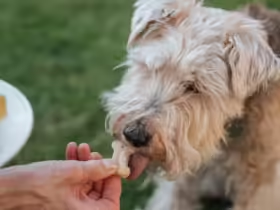Why Do Dogs Eat Grass? Understanding the Motives Behind This Common Behavior
If you’ve ever watched your dog munching on grass during a walk or in the backyard, you might have wondered why they do it. Is it a sign of an underlying issue, or simply a quirky behavior? Understanding why dogs eat grass can help you determine whether it’s a harmless habit or if it warrants further attention. In this blog, we’ll explore the various reasons behind this behavior, from natural instincts to potential health concerns, and provide guidance on when to be concerned.
Common Reasons Dogs Eat Grass
Dogs eating grass is a behavior that has puzzled pet owners and veterinarians alike. Here are some of the most common reasons why dogs might engage in this behavior:
1. Hunger or Nutritional Deficiencies
One reason dogs eat grass could be related to hunger or a need for additional nutrients. Although grass is not a significant source of nutrition, some dogs may munch on it when they’re feeling hungry or if their diet lacks certain nutrients.
- Nutrient Supplementation: Dogs may instinctively seek out plants if their diet is deficient in fiber or other nutrients. However, this is generally not a major concern as most commercial dog foods are formulated to meet all dietary needs.
- Hunger: Sometimes, dogs may eat grass simply out of hunger if they haven’t been fed recently or if their meals aren’t satisfying enough.
2. Boredom and Behavioral Enrichment
Boredom is another common reason for grass-eating. Dogs that don’t receive enough physical or mental stimulation might turn to eating grass as a form of entertainment or distraction.
- Lack of Stimulation: Dogs that are left alone for extended periods or that don’t have enough toys or activities might eat grass as a way to alleviate boredom.
- Behavioral Enrichment: Providing interactive toys, puzzle feeders, and more exercise can help reduce boredom and decrease the likelihood of grass-eating.
3. Upset Stomach or Digestive Issues
Grass consumption is often observed in dogs that have an upset stomach or digestive discomfort. While the reasons behind this are not fully understood, some theories suggest:
- Self-Medication: Dogs may eat grass as a way to induce vomiting if they’re feeling nauseous. The grass might irritate their stomach lining, leading to vomiting, which could relieve discomfort.
- Digestive Aid: Grass contains fiber, which might help some dogs with digestion. Eating grass may help move things along in the digestive tract.
When to Be Concerned
In many cases, eating grass is a normal and harmless behavior. However, there are certain situations where it may be cause for concern:
1. Excessive Consumption
If your dog is eating large amounts of grass regularly, it might indicate a problem. Excessive grass consumption can lead to gastrointestinal issues or even obstructions if the grass is not properly digested.
2. Presence of Toxic Plants
Not all grasses are safe for dogs to eat. Some plants and grasses might be treated with pesticides or contain harmful substances. Make sure your dog’s grazing area is free from toxic plants and chemicals.
3. Accompanying Symptoms
If your dog is eating grass and also showing signs of illness such as vomiting, diarrhea, lethargy, or changes in appetite or behavior, it’s important to consult your veterinarian. These symptoms could indicate an underlying health issue that needs attention.
How to Address Grass-Eating Behavior
If you’re concerned about your dog’s grass-eating habits, here are some strategies to manage and address the behavior:
1. Improve Diet and Nutrition
Ensure your dog’s diet is well-balanced and provides all necessary nutrients. Consult your veterinarian to confirm that your dog’s food meets their dietary needs and consider supplements if necessary.
2. Increase Physical and Mental Stimulation
Provide more exercise, playtime, and interactive toys to keep your dog mentally and physically engaged. Regular walks, agility training, and puzzle games can help reduce boredom and prevent grass-eating.
3. Monitor and Supervise
Keep an eye on your dog during outdoor activities to limit their access to grass. Supervision can help prevent excessive grass consumption and ensure they’re not eating potentially harmful plants.
4. Use Safe Spaces
Designate areas in your yard that are safe for your dog to explore without exposure to harmful plants or chemicals. Consider using designated play areas with pet-safe grass and plants.
When to Consult a Veterinarian
If your dog’s grass-eating is persistent or accompanied by concerning symptoms, it’s best to seek veterinary advice. A veterinarian can help identify any potential health issues, recommend dietary changes, and provide guidance on managing your dog’s behavior.
Conclusion
Grass-eating is a common behavior in dogs that can have various underlying causes, from nutritional deficiencies and boredom to digestive discomfort. While it is often harmless, understanding the reasons behind this behavior and taking appropriate measures can help ensure your dog’s overall health and well-being.
By paying attention to your dog’s habits and providing proper nutrition, enrichment, and supervision, you can address and manage grass-eating behavior effectively. If in doubt, don’t hesitate to consult with your veterinarian to rule out any potential health concerns and keep your furry friend happy and healthy.











Leave a Reply